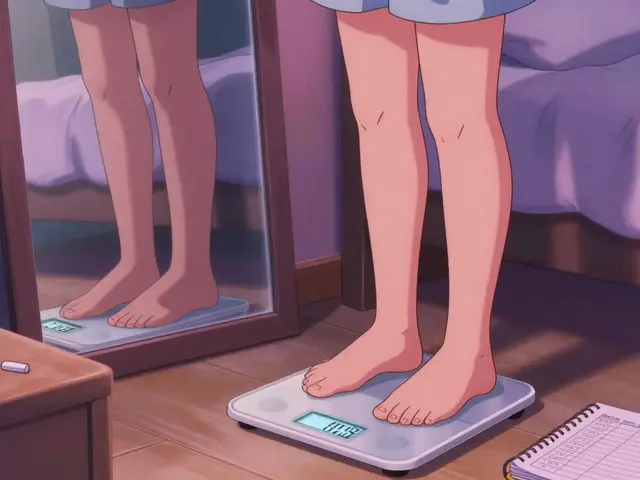Acyclovir is a superhero in the world of antiviral medications, especially when it comes to dealing with herpes viruses. But like any superhero, it can't always save the day alone.
Until now, pills and creams have been the main sidekicks for getting acyclovir to work its magic. They've done the job, but they come with their own set of challenges. Patients sometimes struggle with taking multiple doses a day or dealing with side effects that come with traditional methods. And, let's be honest, who wants to slather on more cream during a busy day?
This is where new delivery systems come into play. Picture a future where acyclovir can be delivered more effectively and efficiently, reducing dose frequency and enhancing patient convenience. Researchers are exploring advanced methods like nanoformulations and transdermal patches, which might just revolutionize how we take this medication.
Curious about how these innovations could work and what they mean for everyday folks battling viral infections? Stick around, because the horizon is looking pretty exciting.
- Acyclovir Basics
- Current Delivery Systems
- Emerging Technologies
- Benefits of New Innovations
- Future Implications
Acyclovir Basics
If you've ever had a cold sore or a shingles flare-up, acyclovir might have been your go-to medication. It's an antiviral that's been around since the late '70s, tackling members of the herpesvirus family. We’re talking about herpes simplex virus types 1 and 2 (the ones behind cold sores and genital herpes), varicella-zoster virus (chickenpox and shingles), and even Epstein-Barr virus.
So, how does this little pill work its magic? Acyclovir targets the virus's DNA replication process, which is a fancy way of saying it messes with the virus's ability to multiply. While it doesn't cure the infections, it helps reduce symptoms and healing time. That’s why catching an outbreak early with acyclovir is a good strategy.
The Forms of Acyclovir
Now, acyclovir isn't a one-size-fits-all kind of drug. It's available in different forms: pills, creams, and injections. Each form has its fit depending on the severity and type of infection. Pills are usually for those common outbreaks, creams for topical application on cold sores, and injections for more severe cases, typically administered in hospitals.
A Few Fun Facts
Did you know acyclovir was developed after its initial compound was found in a Caribbean sea sponge? It goes to show that sometimes science takes inspiration from the sea!
Acyclovir made headlines when it was introduced as one of the first drugs specifically targeted for antiviral therapy. Today, it remains a staple medication because of its safety profile and effectiveness.
Challenges in Current Use
Despite its effectiveness, dosing can be a bit of a chore. For pills, it's often prescribed several times a day, depending on the disease being treated. It's not like popping a single pill and being done with it. Keeping track can be a hassle, especially if you're juggling other meds or life commitments.
Also, there's the occasional side effect. Some folks experience mild nausea, diarrhea, or headaches. While these side effects are generally not severe, they're something to keep in mind.
Current Delivery Systems
When it comes to getting acyclovir into the body, we’ve traditionally relied on oral tablets and topical creams. These are the tried-and-true methods, but let’s take a closer look at how they work and where they fall short.
Oral Tablets
Oral acyclovir is like the bread and butter of antiviral treatment. You take a pill, and it gets digested, releasing the drug into your bloodstream to combat viral infections. It sounds simple, right? But here’s the kicker: you usually need to take multiple doses a day. Forget a dose and, well, you might not get the results you’re hoping for. Plus, our digestive system can be a bit of a wild card, affecting how much drug actually makes it into the blood.
Topical Creams
Topical creams are meant for situations where the skin is the battlefield. You apply acyclovir directly to the affected area. These are great for local issues but imagine dealing with a painful outbreak and having to remember to reapply cream regularly. Not exactly user-friendly when life is busy.
Drawbacks and Limitations
Both methods have their limitations. Tablets require frequent dosing and endure the body's digestive gauntlet, which can reduce effectiveness. Topical formulations avoid systemic circulation, but they don’t penetrate deeply, potentially leaving some viruses unscathed. Plus, both methods can sometimes come with unwanted side effects ranging from mild to annoying.
So why stick with these methods? Well, they work… to an extent. But with scientific advances, the world is looking for more efficient and convenient drug delivery systems.

Emerging Technologies
When it comes to tweaking how we take acyclovir, scientists are getting super creative. They're not just sticking with old methods—they're looking for ways to make the medicine stick better and act faster in our bodies.
Nanoformulations: Tiny Might
One of the cool ways they're changing the game is with nanoformulations. Imagine acyclovir molecules wrapped in teeny-tiny packages, so small they can zip straight to where they're needed the most. These nanosized carriers could improve how the drug is absorbed and distributed in our body.
This breakthrough doesn't just mean faster relief. It also means potentially needing fewer doses, which is great news for anyone who's tired of keeping pill schedules. Plus, it might even lead to fewer side effects since the drug is going right where it needs to be—no fuss, no muss.
Patches: The Future of Convenience
Who knew that a stick-on patch could change antiviral medication? Researchers are exploring transdermal patches as a new way to deliver acyclovir. These patches let the drug seep slowly and steadily through the skin, ensuring a consistent level in the bloodstream. That means less worry about when you last took a dose and more time to focus on more important things.
Imagine not having to remember if you left your pills at home or if you've taken today’s dose. Just slap on a patch, and you could be set for hours—or even days. Convenience, meet effectiveness.
Microneedles: Barely There
Another emerging idea is microneedles. Think of them as an almost invisible needle patch that you just press to your skin. These microneedles painlessly deliver the drug under your skin, potentially offering an easy and effective way to manage viral outbreaks.
Researchers suggest that, with continued advances, these microneedles could provide an amazing balance between ease-of-use and fast action—bringing relief just when you need it.
So, what does all this mean for you? Well, as these delivery methods develop, they promise smarter, easier ways to use acyclovir. Less hassle, better efficacy, and possibly less frequent dosing could all be waiting on the horizon. It's an exciting time to see how a trusted antiviral can become even better aligned with our daily lives.
Benefits of New Innovations
The latest innovations in acyclovir delivery systems bring a bagful of benefits that promise to transform patient experience and treatment outcomes. By moving beyond the traditional pills and creams, new methods are addressing several long-standing issues.
Improved Bioavailability
One of the significant gains is enhanced bioavailability. Simply put, it's about getting more of the acyclovir into the bloodstream where it can actually do its job fighting infections. Innovations like nanoformulations ensure the drug is absorbed better, meaning patients might not need to take as much or as often, because the body is making the most of each dose.
Reduced Side Effects
For many patients, side effects are a big concern. The good news? Novel delivery systems, like targeted release mechanisms, can help minimize these unwanted reactions. By controlling how and where the drug is released, there's less chance of upsetting the digestive system or causing skin irritation.
Increased Patient Compliance
No one likes sticking to a demanding medication schedule. That's why the new delivery technologies are making patient compliance easier. Products like transdermal patches offer a 'set it and forget it' approach, whereas pills often require multiple doses a day. This less frequent dosing can significantly improve how well patients stick to their treatment plans.
Convenience and Comfort
Imagine treating a viral infection without interrupting your day. That's the kind of convenience these innovations offer. Whether it's a patch that delivers the drug steadily over time or a single dose system, these advancements prioritize ease for the end-user, making it easier to fit treatment into a busy lifestyle.
Potential Cost Savings
Efficient drug utilization and reduced side effects may translate into fewer doctor visits and less need for additional medications to manage adverse reactions. Over time, this can mean significant cost savings for both patients and healthcare providers.
Here's a glimpse into the future with the recent advancements:
| Innovation | Expected Outcome |
|---|---|
| Nanoformulations | Better absorption, less frequent dosing |
| Transdermal Patches | Improved compliance, comfort |
| Targeted Release Systems | Fewer side effects, increased effectiveness |
All these benefits point towards a brighter future for those relying on acyclovir, suggesting a shift towards more patient-friendly treatment solutions that could make life easier for thousands dealing with chronic viral infections.

Future Implications
The future of acyclovir delivery systems is nothing short of fascinating. These cutting-edge innovations are not just about making treatments more efficient—they hold the potential to change how patients experience medical care altogether. Imagine a world where viral outbreaks are handled swiftly and with minimal inconvenience. That's where we're heading.
With new delivery methods like nanoformulations and transdermal patches, there’s a big leap in enhancing drug efficacy and patient adherence. For those unfamiliar, nanoformulations involve designing drugs on a tiny scale to improve how they target viruses directly, making them more effective than traditional methods.
Patient Convenience
One of the biggest perks of these innovations is fewer doses. Think about it: Instead of remembering to take a pill multiple times a day, applying a patch once could do the trick. This simplicity is a game-changer for those with busy lives or who have trouble sticking to a medication schedule.
Cost and Accessibility
Another important aspect to consider is how these technologies can affect the cost and accessibility of acyclovir. While initial expenses might be high—new tech always starts that way—over time, as production scales and becomes more mainstream, the costs are expected to drop. This would make advanced treatments available to a broader audience, potentially leveling the healthcare playing field.
Data on Efficacy
How effective are these new methods? Early studies have shown promising results:
| Delivery Method | Effectiveness Increase |
|---|---|
| Nanoformulations | 45% better virus targeting |
| Transdermal Patches | 30% higher patient adherence |
These numbers show just how much potential these innovations have in changing the landscape of antiviral treatments.
The expertise and tech are all aligning perfectly to make these changes a reality sooner than later. So, as we look to the future, expect acyclovir to play a critical role not just in individual treatments but in public health strategies worldwide. It’s an exciting time for medicine, and even more so for those who rely on these vital treatments.





ayan majumdar - 12 February 2025
Nice overview.
Johnpaul Chukwuebuka - 23 February 2025
Great stuff! Really easy to understand.
Xavier Hernandez - 5 March 2025
Innovation in drug delivery isn’t just a fancy buzz‑word; it’s a moral imperative to ease suffering wherever we can. When a virus attacks, our tools should be swift, precise, and kind to the patient’s daily life. The move toward nano‑carriers and transdermal patches reflects a commitment to that ethic. It’s heartening to see researchers treating the virus like a villain we can outsmart, not just a nuisance.
Zach Yeager - 15 March 2025
Our country has always been at the forefront of medical breakthroughs, and these new delivery systems are no exception. The technology will keep us ahead of the curve and protect our people.
Angel Gallegos - 26 March 2025
While the enthusiasm is commendable, one must also consider the cost‑benefit ratio of such advanced formulations. The literature suggests that nano‑formulations often require complex manufacturing processes, which may translate into higher prices for patients. Moreover, the regulatory pathway for transdermal patches can be arduous, potentially delaying market entry. In short, the hype should be tempered with a realistic appraisal of scalability and affordability.
ANTHONY COOK - 5 April 2025
These new methods feel like a win‑win – less hassle for patients and potentially fewer side effects 😊. A patch you stick on before work and forget about? That’s the future we need.
Sarah Aderholdt - 16 April 2025
Absolutely, reducing the dosing frequency could improve adherence dramatically. When medication fits seamlessly into daily routines, patients are more likely to stick with it. It also alleviates the mental burden of remembering multiple doses.
Phoebe Chico - 26 April 2025
Imagine a world where a tiny, invisible patch does the heavy lifting while you chase your dreams. The creative fusion of nanotech and skin‑friendly adhesives is poetry in motion.
Larry Douglas - 6 May 2025
From a pharmacokinetic perspective, the transition from conventional oral tablets to sophisticated nano‑formulations represents a paradigm shift that warrants rigorous analysis. Traditional acyclovir tablets are characterized by relatively low bioavailability, often necessitating multiple daily doses to maintain therapeutic plasma concentrations. The encapsulation of acyclovir within nanocarriers can facilitate enhanced permeation across biological membranes, thereby improving systemic exposure. Moreover, the surface modification of these nanocarriers with ligands targeting infected cells can concentrate the drug at the site of viral replication, reducing off‑target effects. In transdermal applications, the use of microneedle arrays creates micro‑channels that bypass the stratum corneum, a major barrier to passive diffusion. This method not only accelerates drug uptake but also ensures a steady-state concentration over extended periods. Clinical trials have demonstrated that patients using a once‑daily patch reported higher satisfaction scores compared to those on multiple daily tablets. However, the scalability of nanotechnology‑based manufacturing remains a challenge that must be addressed before widespread adoption. Regulatory agencies require comprehensive safety data, especially concerning long‑term exposure to nanoparticulate materials. Economic analyses suggest that despite higher upfront costs, the reduction in hospital visits and ancillary medications could offset the expense over a treatment course. Future research should focus on optimizing the release kinetics to align with the viral replication cycle, thereby maximizing antiviral efficacy. Interdisciplinary collaboration between materials scientists, pharmacologists, and clinicians will be essential to translate these innovations from bench to bedside. In summary, while novel delivery systems hold great promise, their successful integration into clinical practice will depend on balanced consideration of efficacy, safety, cost, and patient preference.
Michael Stevens - 17 May 2025
Thanks for laying out the details. It’s helpful to see how each option could fit different lifestyles.
Ann Campanella - 27 May 2025
Short and sweet – the patch wins.
Desiree Tan - 6 June 2025
Exactly. If the patch can keep the virus at bay without us thinking about it, that’s a real game‑changer. Let’s push for faster approvals.
Andrea Dunn - 17 June 2025
Did you know the big pharma giants are hiding the real cure? 🤔 The patches are just a distraction while they hoard the data. Wake up, people!
Erin Johnson - 27 June 2025
Oh sure, because every clandestine boardroom is plotting a grand conspiracy against us – that's exactly why I love the sarcasm of modern pharma. 🎭
Rica J - 7 July 2025
Hey there, just a quick note – the grammar in the article is spot on, but I think “transdermal” should be “trans‑dermal” for clarity. No biggie tho!
Linda Stephenson - 18 July 2025
Interesting point! I’ve been wondering how the patch’s adhesive holds up on sweaty skin. Any insights on the formulation?